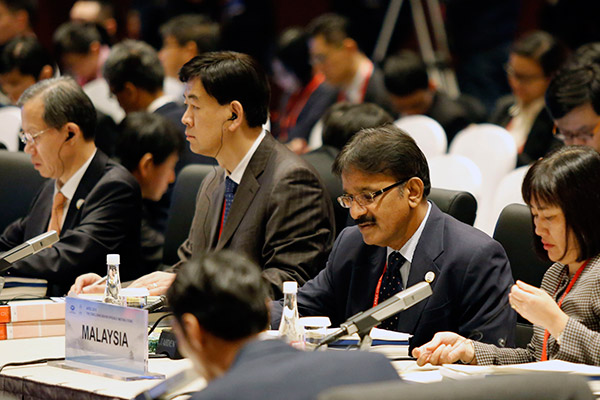
Representatives of 21 economies gather at the Asia-Pacific Economic Cooperation senior officials’ session in Beijing on Nov 5, marking the beginning of the APEC week that will culminate in the Economic Leaders’ Meeting.[Photo by Wang Zhuangfei/China Daily]
Senior officials at regional meeting discuss reform and innovation.
As a “final rehearsal” for next week’s Asia-Pacific Economic Cooperation leaders’ meeting, senior officials from the 21 member economies of APEC gathered in Beijing on Nov 5 to finalize policy details that aimed at reinvigorating trade, productivity and sustainable development.
The two-day event, to be followed by an APEC ministerial meeting and an APEC CEO meeting, marked the start of the long-awaited 2014 APEC Economic Leaders’ Week, which will culminate at the economic leaders’ meeting on Nov 10 and Nov 11 at Yanqi Lake, a resort town 50 kilometers north of Beijing.
Li Baodong, vice-minister of Foreign Affairs and chair of the 2014 APEC Senior Officials’ Meetings, led the final round of coordination among representatives. Under the theme “Shaping the Future Through Asia-Pacific Partnership”, this year’s APEC meetings also coincide with the 25th anniversary of the organization’s foundation.
Earlier this year, Li said one of the “ambitious goals” of the 2014 APEC meetings was to launch the Free Trade Area of the Asia-Pacific undertaking. A road map for achieving the FTAAP is likely to be announced during the final economic leaders’ meeting.
Discussion on Nov 5 centered on deepening regional economic integration, promoting economic reform and innovative development, and building infrastructure investment and comprehensive connectivity.
Representatives said the meetings have injected energy toward the APEC goal of a FTAAP, a comprehensive free trade agreement to build on emerging regional undertakings such as the Trans Pacific Partnership and Regional Comprehensive Economic Partnership.
Lauding this year’s goals, set by China, as “in-depth and broad in scope”, Valery Sorokin, Russia’s senior official for APEC, said Moscow is expecting the meetings to yield concrete action to streamline the process of navigating toward the FTAAP.
“We have been talking about the concept since 2006 and have agreed in principle that the integration process should be based on openness, transparency and inclusiveness,” Sorokin said.
“The establishment of the FTAAP will be an important and delicate process, which calls for every member economy to build capacity and improve connectivity,” he added.
Actions aimed at deepening structural reforms and creating opportunities for small businesses in global production chains are also among the senior officials’ concerns.
Zhang Lijun, chairman of the China APEC Development Council, said calls to break through trade barriers to facilitate a vast united Asia-Pacific market have been growing stronger over the years in the region.
“It is not only China that is going through tough battles of economic structural readjustment and reforms, other emerging economies in the region face similar challenges as well,” Zhang said.
Sorokin said APEC economies have all pinned down structural reforms as a necessity, which should be a continuous and long-term process.
“All the reforms should be social-oriented and concentrate on the well-being of the people,” he said.
As the world’s largest regional economic bloc, APEC also aims to reduce tariffs on 54 “environmental goods” to five percent or less by the end of 2015 to boost trade and green growth among member economies.
Member economies together account for about 40 percent of the world’s population, 50 percent of global trade and 60 percent of total gross domestic product.
